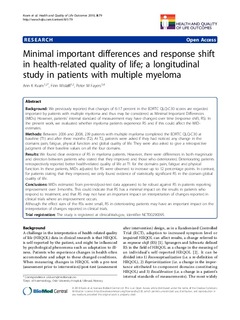| dc.contributor.author | Kvam, Ann Kristin | |
| dc.contributor.author | Wisløff, Finn Georg B | |
| dc.contributor.author | Fayers, Peter | |
| dc.date.accessioned | 2015-09-29T12:37:00Z | |
| dc.date.accessioned | 2015-10-22T11:06:20Z | |
| dc.date.available | 2015-09-29T12:37:00Z | |
| dc.date.available | 2015-10-22T11:06:20Z | |
| dc.date.issued | 2010 | |
| dc.identifier.citation | Health and Quality of Life Outcomes 2010, 8(79) | nb_NO |
| dc.identifier.issn | 1477-7525 | |
| dc.identifier.uri | http://hdl.handle.net/11250/2357728 | |
| dc.description.abstract | Background: We previously reported that changes of 6-17 percent in the EORTC QLQ-C30 scores are regarded
important by patients with multiple myeloma and thus may be considered as Minimal Important Differences
(MIDs). However, patients’ internal standard of measurement may have changed over time (response shift, RS). In
the present work, we evaluated whether myeloma patients experience RS and if this could affect the MIDestimates.
Methods: Between 2006 and 2008, 239 patients with multiple myeloma completed the EORTC QLQ-C30 at
baseline (T1) and after three months (T2). At T2, patients were asked if they had noticed any change in the
domains pain, fatigue, physical function and global quality of life. They were also asked to give a retrospective
judgment of their baseline values on all the four domains.
Results: We found clear evidence of RS in myeloma patients. However, there were differences in both magnitude
and direction between patients who stated that they improved and those who deteriorated. Deteriorating patients
retrospectively reported better health-related quality of life at T1 for the domains pain, fatigue and physical
function. In these patients, MIDs adjusted for RS were observed to increase up to 12 percentage points. In contrast,
for patients stating that they improved, we only found evidence of statistically significant RS in the domain global
quality of life.
Conclusions: MIDs estimated from pre-test/post-test data appeared to be robust against RS in patients reporting
improvement over 3-months. This could indicate that RS has a minimal impact on the results in patients who
respond to treatment, and that RS may not have an important impact on interpretation of changes reported in
clinical trials where an improvement occurs.
Although the effect sizes of the RSs were small, RS in deteriorating patients may have an important impact on the
interpretation of changes reported in clinical trials. | nb_NO |
| dc.language.iso | eng | nb_NO |
| dc.publisher | BioMed Central | nb_NO |
| dc.relation.uri | http://www.ncbi.nlm.nih.gov/pmc/articles/PMC2922103/pdf/1477-7525-8-79.pdf | |
| dc.title | Minimal important differences and response shift in health-related quality of life; a longitudinal study in patients with multiple myeloma | nb_NO |
| dc.type | Journal article | nb_NO |
| dc.type | Peer reviewed | en_GB |
| dc.date.updated | 2015-09-29T12:37:00Z | |
| dc.source.volume | 8 | nb_NO |
| dc.source.journal | Health and Quality of Life Outcomes | nb_NO |
| dc.source.issue | 79 | nb_NO |
| dc.identifier.doi | 10.1186/1477-7525-8-79 | |
| dc.identifier.cristin | 515816 | |
| dc.description.localcode | © 2010 Kvam et al; licensee BioMed Central Ltd. This is an Open Access article distributed under the terms of the Creative Commons Attribution License (http://creativecommons.org/licenses/by/2.0), which permits unrestricted use, distribution, and reproduction in any medium, provided the original work is properly cited. | nb_NO |
